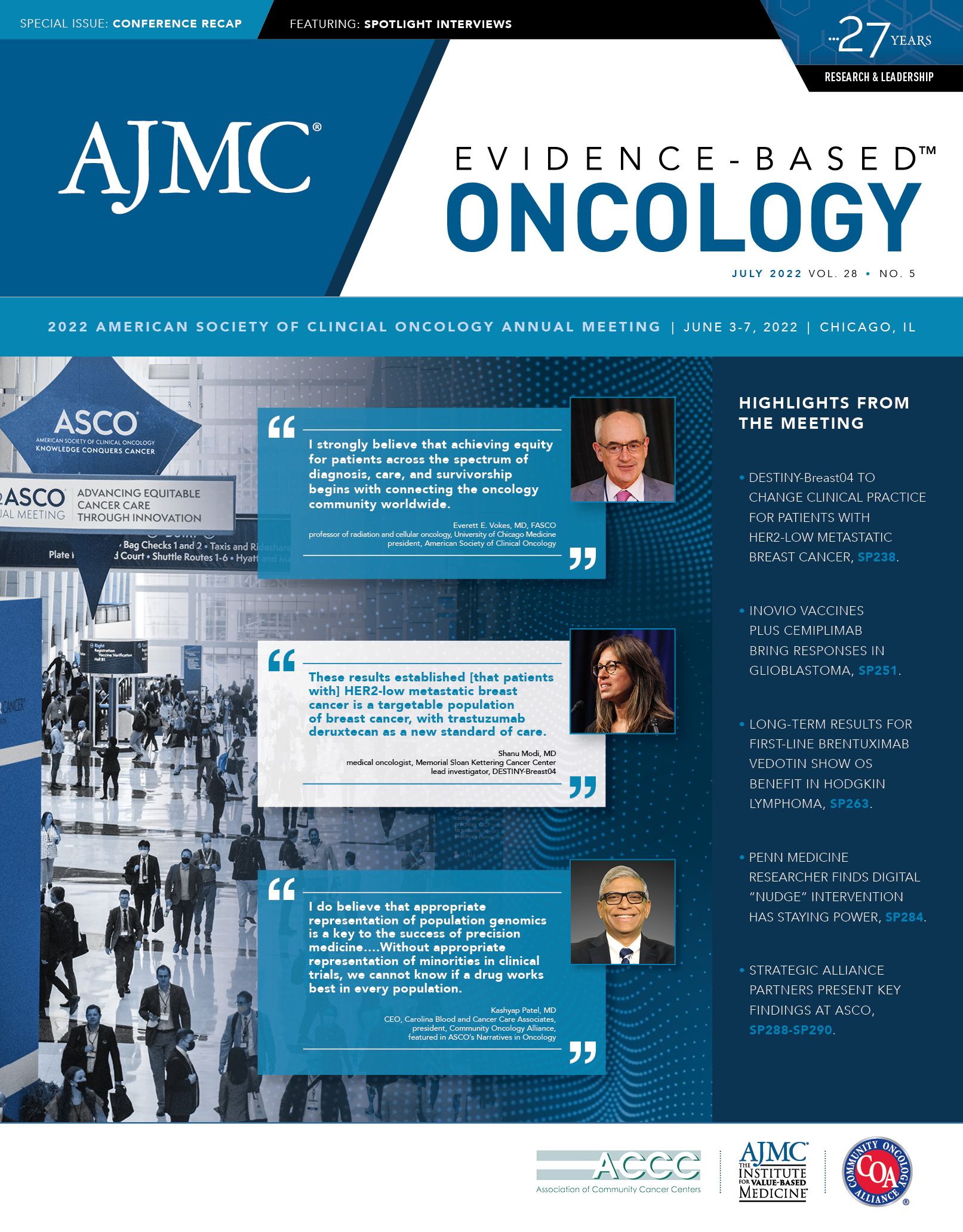- Center on Health Equity & Access
- Clinical
- Health Care Cost
- Health Care Delivery
- Insurance
- Policy
- Technology
- Value-Based Care
ASCO Spotlight With Joel Neal, MD, PhD: Says Cabozantinib/Atezolizumab May Fulfill Unmet Need in NSCLC
Joel Neal, MD, PHD, associate professor, Division of Oncology, Stanford Cancer Institute, discussed phase 1b results in COSMIC-021 in non-small cell lung cancer.
For patients with non–small cell lung cancer (NSCLC) and no option of a targeted treatment due to genetic alteration, cabozantinib plus atezolizumab could become a second-line treatment beyond chemotherapy, noted Joel Neal, MD, PhD, an associate professor in the Division of Oncology at Stanford Cancer Institute in California.
Neal, lead investigator on the COSMIC-021 trial (NCT03170960), spoke with Evidence-Based Oncology™ (EBO) about the updated analyses presented at the 2022 annual meeting of the American Society of Clinical Oncology (ASCO).
EBO: What do the phase 1b results from COSMIC-021 show in NSCLC?
Neal: The COSMIC-021 phase 1b study included a number of different cohorts across a number of different types of tumors, as well as a number of different patients with NSCLC. One of the most interesting cohorts in my opinion was cohort 7, in which patients who had had prior immune checkpoint inhibitor therapy, plus or minus optional platinum chemotherapy, then went on at time of tumor progression to get second-line treatment with cabozantinib plus atezolizumab.
We reported at ASCO a couple of years ago that the first 30 patients had a significant response rate, higher than we would have seen otherwise, in the 20% range. We would have expected cabozantinib or chemotherapy alone to [have] more like less than 10% response rates. So based on that, in this phase 1b we expanded that cabozantinib cohort to include 81 patients and started [randomly assigning] them in the middle between the cabozantinib-plus-atezolizumab cohort and a cabozantinib-alone cohort to try and get a sense of how cabozantinib [was] performing alone after prior immunotherapy in the frontline setting, as well as together with continued immunotherapy.
EBO: What unmet need in NSCLC is potentially addressed through treatment with cabozantinib plus atezolizumab?
Neal: From here, we’re excited that cabozantinib plus atezolizumab might have a role in the second-line treatment of NSCLC. Docetaxel alone is the approved therapy, but often providers use other single-agent chemotherapies relatively interchangeably—of course with the exception of patients with tumors harboring targeted alterations like EGFR, ALK, and all the other molecular alterations we have.
So for those patients without a targetable therapy, [we are] encouraged that the second-line treatment using this VEGF small molecule inhibitor plus immunotherapy, a strategy that’s been successful in renal cell cancer and is emerging in other cancers, may meet this unmet need of something other than chemotherapy to offer [patients] in the second-line setting. To establish that, we’re still running a phase 2 clinical trial (NCT04310007), which has 3 arms of cabozantinib/nivolumab, cabozantinib alone, and [investigator’s] choice of single-agent chemotherapy. That’s the ECOG-ACRIN EA5191 study. And then there’s also a phase 3 study being run, the CONTACT-01 study (NCT04471428), which has finished accrual, which is [evaluating] cabozantinib and atezolizumab vs docetaxel.
So as we present these data, it’s very exciting to actually say that the phase 3 is already done and we’re awaiting the results. Hopefully that could be practice changing soon.
Reference
Neal JW, Santoro A, Viteri S, et al. Cabozantinib (C) plus atezolizumab (A) or C alone in patients (pts) with advanced non–small cell lung cancer (aNSCLC) previously treated with an immune checkpoint inhibitor (ICI): results from cohorts 7 and 20 of the COSMIC-021 study. J Clin Oncol. 2022;40(suppl 16):9005. doi:10.1200/JCO.2022.40.16_supp.9005

HEDIS Glycemic Goal Achieved Using Control-IQ Technology
December 22nd 2025A greater proportion of patients with type 1 diabetes who used automated insulin delivery systems vs multiple daily injections achieved the Healthcare Effectiveness Data and Information Set (HEDIS) glycemic measure.
Read More
Linking Data to Determine Risk for 30-Day Readmissions in Dementia
December 22nd 2025This study found that certain characteristics in linked electronic health record data across episodes of care can help identify patients with Alzheimer disease and related dementias at high risk of 30-day readmissions.
Read More
Performance of 2-Stage Health-Related Social Needs Screening Using Area-Level Measures
December 19th 2025Limiting health-related social needs screening to lower-income areas would reduce screening burdens; however, this study found a 2-stage screening approach based on geography to be suboptimal.
Read More
Impact of Medicaid Institution for Mental Diseases Exclusion on Serious Mental Illness Outcomes
December 17th 2025Medicaid’s Institution for Mental Diseases (IMD) rule bars federal funding for psychiatric facilities with more than 16 beds, but findings indicate that state waivers allowing treatment of serious mental illness in IMDs do not increase overall psychiatric hospitalizations.
Read More
